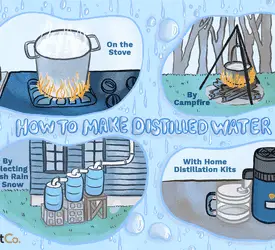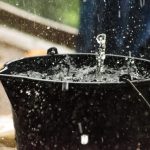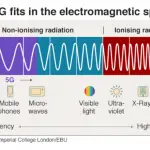Last Updated on 1 year by Francis
Rainwater is a valuable natural resource that can be used in a variety of different ways. One of these ways is to boil rainwater and use it for various purposes, from drinking to cleaning. But can we actually boil rainwater safely and efficiently? In this article, we will discuss the benefits and drawbacks of boiling rainwater, as well as provide tips on how to do it safely. So, if you’re wondering if it’s possible to boil rainwater, read on to find out!
:max_bytes(150000):strip_icc()/making-distilled-water-609427_FINAL-95eed47d40de4d34b57bd3ec1ba7ce21.png)
Contents
Can We Boil Rainwater to Make it Safe?
Rainwater has long been a source of fresh drinking water for many people around the world. In some parts of the world, it is the only source of fresh water. But can you boil rainwater to make it safe to drink? The answer is yes, boiling rainwater is a great way to make it safe for consumption.
Boiling rainwater will kill any harmful bacteria or organisms that may be present in the water. It is important to remember that even if the water looks clean, there may still be bacteria or organisms in the water that could make you sick. Boiling the water for at least one minute will ensure that the water is safe to drink.
In order to boil rainwater, you will need a pot or container that is suitable for boiling water. Make sure that the container you use is free of chemicals that could leech into the water. Boil the water until it reaches a rolling boil and then let it cool before drinking.
Is Boiling Rainwater Enough to Make it Safe?
Boiling rainwater is an effective way to make it safe to drink, but it is not the only method. If the water is contaminated with heavy metals or chemicals, boiling will not remove these contaminants. In these cases, other methods of purification, such as filtration or reverse osmosis, may be necessary to make the water safe to drink.
Additionally, if the water is cloudy or has a bad odor, boiling may not remove these contaminants. In these cases, it is best to use other methods of purification, such as filtration, to remove the contaminants and make the water safe to drink.
What Are the Benefits of Boiling Rainwater?
Boiling rainwater is a great way to make it safe to drink. It is a simple and inexpensive method of purification that can be done anywhere. Boiling rainwater is also a great way to kill any bacteria or organisms that may be present in the water, making it safe to drink.
What Are the Drawbacks of Boiling Rainwater?
Boiling rainwater has some drawbacks. Boiling will not remove any heavy metals or chemicals that may be present in the water. If the water is cloudy or has a bad odor, boiling will not remove these contaminants. Additionally, boiling the water can take a long time and uses a lot of fuel, making it an inefficient method of purification.
What Are the Alternatives to Boiling Rainwater?
If boiling rainwater is not an option, there are other methods of purification that can be used. Filtration is a great alternative to boiling and can be used to remove heavy metals and chemicals. Additionally, reverse osmosis is a great way to remove contaminants and make the water safe to drink.
How to Store Boiled Rainwater?
Once the rainwater has been boiled, it is important to store it in a clean container. Make sure the container is free of chemicals that could leech into the water. Additionally, make sure the container is covered to prevent any contaminants from getting into the water.
Top 6 Frequently Asked Questions
Question 1: Can We Boil Rain Water?
Answer: Yes, we can boil rain water. Boiling is one of the oldest and most reliable methods of water purification, and rain water is no exception. Boiling rain water will kill most bacteria and parasites, making it safe to drink. Boiling is especially important if the rain water has been stagnant or in contact with animal or human waste. It is important to remember that boiling will not remove pollutants or other contaminants such as lead, so it is still important to filter the water after boiling.
Question 2: What Is the Process of Boiling Rain Water?
Answer: Boiling rain water is a simple process. First, collect the rain water in a clean container. Make sure the container is free of any dirt or debris that could contaminate the water. Next, heat the water in a pot or pan until it reaches the boiling point (212°F or 100°C). Allow the water to boil for one minute, then turn off the heat and let the water cool before drinking.
Question 3: How Long Does It Take to Boil Rain Water?
Answer: Boiling rain water typically takes about 10 to 15 minutes from start to finish. This includes the time it takes to collect the rain water, heat it up, and let it cool before drinking. Boiling the water for one minute is the most important step, as this will kill most bacteria and parasites that may be present in the water.
Question 4: Is Boiling Rain Water Enough to Make It Safe to Drink?
Answer: Boiling rain water is an effective way to make it safe to drink, as it will kill most bacteria and parasites that may be present. However, it is important to note that boiling will not remove pollutants or other contaminants such as lead, so it is still important to filter the water after boiling.
Question 5: Is Boiling the Only Way to Purify Rain Water?
Answer: No, boiling is not the only way to purify rain water. There are a variety of other methods that can be used to purify rain water, such as chlorination, filtration, and ultraviolet light. Each of these methods has its own advantages and disadvantages, so it is important to research the best option for your particular situation.
Question 6: Will Boiling Rain Water Make It Taste Better?
Answer: Boiling rain water will not necessarily make it taste better, but it can help to remove some of the contaminants that cause it to taste unpleasant. Boiling will kill any bacteria or parasites that may be present in the water, and it can also help to reduce pollutants such as chlorine. However, it is important to remember that boiling will not remove all pollutants and contaminants, so it is still important to filter the water after boiling.
3 Way To Make Rainwater Drinkable
In conclusion, while it is possible to boil rain water to make it safe for drinking, it is not recommended as the water may contain unwanted contaminants that can cause harm. Boiling rain water can also be time consuming and expensive. It is therefore recommended that you use treated water from a reputable source for drinking purposes.








